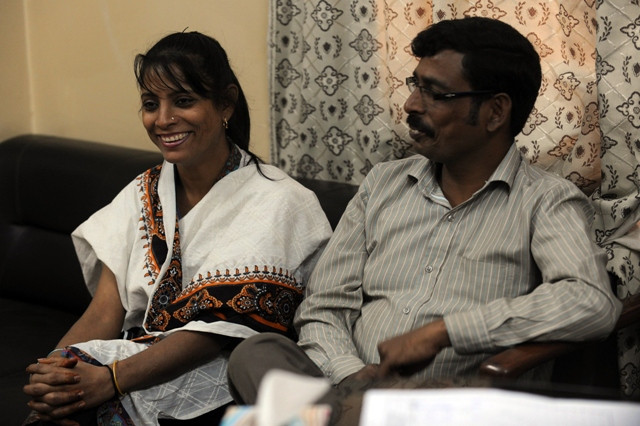Pakistan's shunned HIV victims fight pariah status
Rubina and Iqbal, a Pakistani couple struggle to spread the message of respect for fellow victims of HIV/AIDS.

Rubina Naz, 33, one of 12 children born to a labourer, was diagnosed with HIV four years ago, a year after her drug-addicted husband passed away.
"I didn't know what it was until I was tested positive. I was afflicted with this horrible disease by my first husband, who was an AIDS victim," said Rubina.
They married when she was 16 years old and had two daughters and two sons together, but Rubina was unaware of her husband's illness until she read his medical tests after his death and friends advised her to take her own.
Finding out she was HIV positive ruined her life.
"My in-laws threw me out and took my kids. Even most of my own family treated me like a sinner and stayed away when I was desperate to be helped. Those days were horrible," she said.
Pakistan, the second-largest country in South Asia, stands a few steps behind India and Nepal in terms of the extent of the HIV epidemic.
The National AIDS Control Programme says Pakistan is a "low prevalence, high risk" country, with low rates of the virus across the general population but a high concentration among risk groups such as injecting drug users.
UN figures from 2009 show that there are an estimated 97,400 cases of HIV/AIDS in Pakistan.
Rubina's meals were always served separately to the rest of her family, who were fearful of contracting the disease, but with her mother's support she says she has overcome prejudice.
She now works as a kitchen assistant at charity Pakistan Society, dedicated to helping HIV positive people, which is where she met her new husband Mohammad Iqbal, 35, who is HIV positive and recovering from drug addiction.
Iqbal was a tailor in his teens when he was introduced to heroin by friends. He contracted the virus 10 years ago by sharing needles to inject the drug.
"My addiction shocked my parents, who both died early, then my brothers threw me out of home and I was forced to live on the streets," he said.
A charity gave him the tests that led to his diagnosis. But it was another three years before he decided to get well.
"Continuous hatred towards me wore me out. I decided to live a meaningful life or end it. I opted to live and agreed to get rehabilitated," he said.
Rubina and Iqbal found each other in the kitchen, which serves food to patients and visitors at the charity's medical centre.
The charity also goes into communities to help drug addicts across the southern city of Karachi and the wider Sindh province, where it spreads the message that HIV victims can live a normal life and should not be cast out.
"Now I don't hesitate to see myself in the mirror. I am regaining my lost respect in the world," Iqbal said.
Rubina's in-laws have agreed to allow her children to see her regularly and Iqbal's brothers have permitted him to rejoin the family.
Anti-retroviral drugs that treat the illness are provided free of charge at state-run hospitals, clinics and health centres across Pakistan, meaning that those diagnosed have the chance of a relatively normal life.
So long as Rubina and Iqbal continue to take their daily medication and maintain a healthy lifestyle, Pakistan Society head Saleem Azam said their prognosis is good and their life expectancy should not be affected.
Azam said that women are the least documented victims.
The 2009 survey revealed that 15 percent of wives of injecting drug users in just one district, Larkana, where Pakistan's political dynasty the Bhuttos have their ancestral seat, are HIV sufferers.
But Azam said the actual incidence may be much higher as many cases go undetected and there could be many women "who die of the disease without even knowing what happened to them."
"In our male dominant society women have fewer choices to save themselves from their HIV positive husbands. The majority have not heard of the disease and if they do they cannot stop their husbands from afflicting them."
Rubina and Iqbal have taught their families to respect HIV-positive people but say they will continue their quest to educate the rest.
"It is not over yet as the rest of society is still there to be educated," said Rubina.



















COMMENTS
Comments are moderated and generally will be posted if they are on-topic and not abusive.
For more information, please see our Comments FAQ